Physical Address
304 North Cardinal St.
Dorchester Center, MA 02124
Physical Address
304 North Cardinal St.
Dorchester Center, MA 02124

Uncover the hidden costs and surprising truths about RV versus tent camping that could completely change your outdoor adventure strategy.
You’re standing at a crossroads that’ll shape every camping trip you take. On one side, there’s the allure of RV comfort—climate control, running water, and effortless setup. On the other, tent camping beckons with its budget-friendly appeal and authentic outdoor experience. Your choice affects everything from your wallet to your connection with nature. But here’s what most campers don’t consider before they commit to either path.
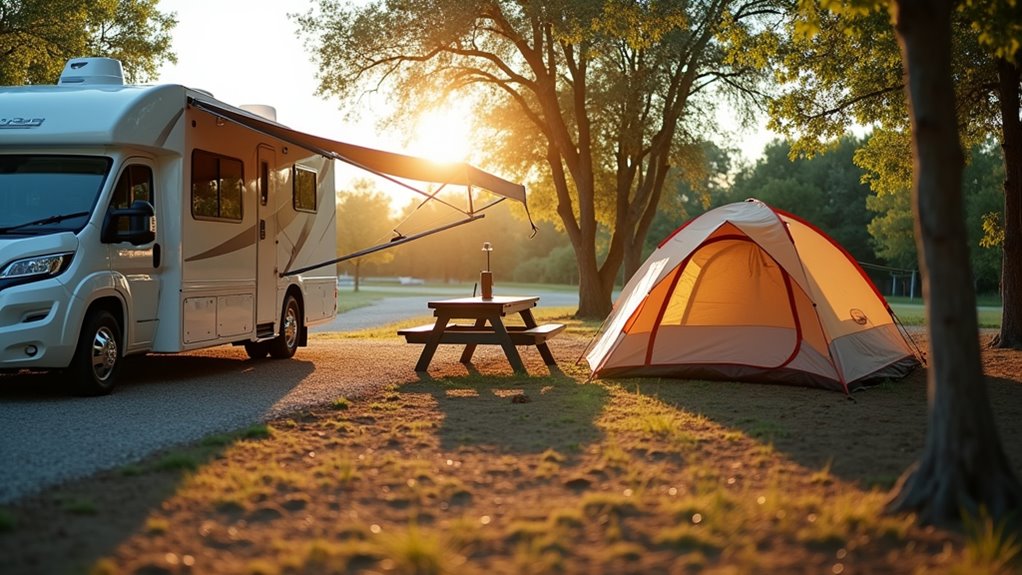
When you’re weighing RV camping against tent camping, the financial reality hits hard from day one. You’ll spend anywhere from $10,000 to $300,000+ for an RV, while quality tent gear costs under $1,000.
But don’t stop counting there.
RVs demand insurance, registration, maintenance, and repairs that’ll drain your wallet annually. You’re looking at thousands in upkeep costs.
Campground fees hit harder too – RV sites typically cost $30-80 nightly versus $15-30 for tent spots.
Tent camping keeps expenses minimal after your initial gear purchase. You’ll replace worn items occasionally, but there’s no insurance, no mechanical breakdowns, and cheaper campsite options everywhere.
Your wallet stays fuller, leaving more money for actual adventures rather than equipment payments.
Once you’ve arrived at your destination, the real work begins – and the time investment couldn’t be more different between these camping styles. With tent camping, you’ll spend 30-45 minutes setting up camp: unpacking gear, pitching your tent, organizing sleeping arrangements, and establishing your cooking area. Every trip requires this full setup process.
RV camping drastically cuts your preparation time. You’ll simply level your rig, connect utilities, and extend your awning – typically 10-15 minutes max. Your bed’s already made, kitchen’s stocked, and bathroom’s ready. Plus, you can enjoy your fresh coffee immediately without the need to set up a separate brewing station like tent campers often require.
However, RVs require more complex campsite preparation beforehand. You’ll need reservations at RV-friendly campgrounds with appropriate hookups, while tent campers can often find last-minute spots at basic sites for considerably less money.
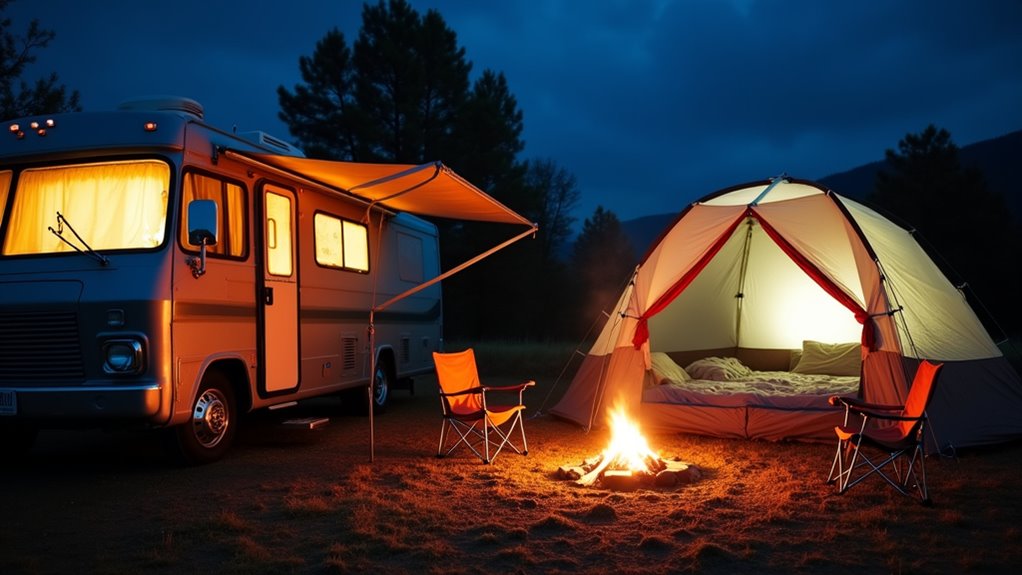
Beyond the setup process, the daily living experience between RV and tent camping feels like comparing a studio apartment to backcountry survival.
In your RV, you’ll have running water, electricity, climate control, and often a full kitchen with refrigeration. You can charge devices, take hot showers, and sleep on an actual mattress. Modern RVs include WiFi, entertainment systems, and comfortable seating areas.
Tent camping strips away these luxuries. You’ll rely on campground facilities for restrooms and showers, cook on portable stoves, and sleep on the ground with minimal insulation. Your phone becomes a precious resource you’ll need to conserve. Weather directly impacts your comfort level.
For adventurous campers seeking extreme outdoor challenges, glacier climbing trails across the US offer some of the most demanding backcountry experiences where even basic tent camping luxuries become impossible.
The trade-off? RV amenities cost considerably more upfront and ongoing, while tent camping keeps expenses minimal but demands greater adaptability.
While comfort amenities matter for daily convenience, weather protection becomes critical for safety and sleep quality. Your RV provides superior shelter with solid walls, sealed windows, and climate control systems. You’ll stay dry during storms and maintain comfortable temperatures through heating and air conditioning.
RVs deliver unmatched weather protection with solid construction and climate control systems that ensure safety and quality sleep regardless of conditions.
However, this protection comes at a cost—RVs require electrical hookups or generator fuel to power these systems.
Tents offer basic weather protection but can’t match RV performance. You’ll face condensation issues, temperature fluctuations, and potential leaks during heavy rain. Yet tents excel in budget-friendly weather management.
A quality four-season tent costs hundreds versus thousands for RV climate systems. You’ll also develop valuable outdoor skills and adaptability.
Just as mountaineers face extreme weather conditions when conquering Mount Kilimanjaro, tent campers build resilience through direct exposure to the elements.
Choose RVs for guaranteed comfort or tents for affordable adventure with weather resilience.
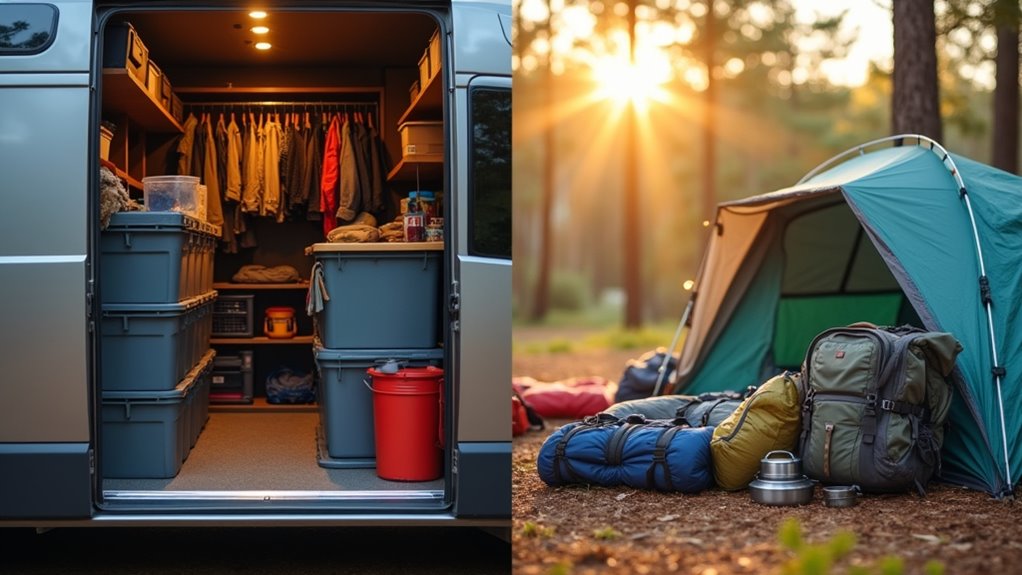
Storage capacity dramatically affects what you can bring on your camping trip and how you’ll organize your gear. RVs offer abundant storage with built-in cabinets, closets, and compartments that keep everything organized and accessible. You’ll pack like you’re moving into a temporary home, bringing full-sized cookware, multiple clothing options, and comfort items without weight restrictions.
Tent camping requires strategic packing since you’re limited by your vehicle’s capacity and what you can physically carry. You’ll need to prioritize essentials and choose lightweight, multi-purpose items. Every piece of gear must earn its space, which means leaving behind conveniences you’d easily bring in an RV. For extended wilderness trips where you’ll be carrying everything on your back, planning creative backpacking food becomes essential to minimize weight while maintaining proper nutrition.
However, tent camping‘s packing limitations often lead to more intentional, minimalist experiences that many campers find liberating and budget-friendly.
Your choice between RV and tent camping considerably impacts where you can actually set up camp. RVs need designated sites with hookups, level ground, and adequate space for maneuvering. You’re limited to established campgrounds that accommodate your rig’s size and weight, which often means booking well in advance and paying premium rates.
Tent camping opens up notably more options. You can access primitive sites, backpacking locations, and dispersed camping areas where RVs can’t venture. National forests offer free camping spots that RVs simply can’t reach. You’ll also find tent sites available when RV spots are booked solid.
However, tent camping means you’ll sacrifice convenience for flexibility. You won’t have immediate access to bathrooms, showers, or electrical hookups that RV campgrounds provide. If you’re planning camping adventures with children, consider researching camps for kids that offer structured outdoor programs to help them develop camping skills and confidence before your family camping trips.
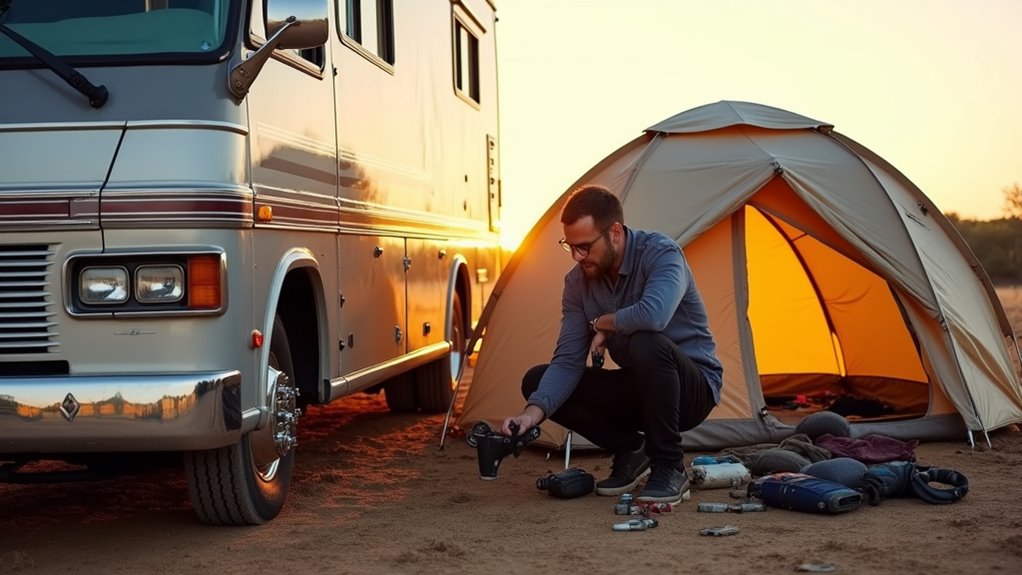
When it comes to maintenance, RVs demand considerably more time, money, and expertise than tents ever will. You’ll need to winterize plumbing systems, maintain engines, check tire pressure, and service generators regularly. RV repairs can cost thousands – a busted water heater or air conditioning unit will hit your wallet hard. You’ll also deal with roof leaks, electrical issues, and appliance breakdowns.
Tents require minimal upkeep. You’ll occasionally patch small holes, clean off dirt, and ensure zippers work properly. A $20 repair kit handles most tent problems. Storage is simple too – just keep your tent dry and avoid sharp objects.
Your maintenance budget and mechanical skills should heavily influence your camping choice. RVs offer comfort but demand significant ongoing investment. If you’re seeking more excitement in your outdoor adventures, consider exploring adventurous camping tricks that can enhance your experience regardless of which accommodation type you choose.
Beyond maintenance concerns, the size of your camping group plays a major role in determining whether an RV or tent makes more sense for your adventures. If you’re camping solo or with just one other person, tents offer unbeatable affordability and flexibility. You can easily find budget-friendly sites and won’t need massive campgrounds.
However, larger families or groups of four or more will find RVs increasingly cost-effective per person. You’ll get dedicated sleeping areas, shared living space, and essential amenities like bathrooms and kitchens.
For groups of four or more, RVs become surprisingly economical while delivering private bedrooms, communal areas, and built-in facilities.
Large families in tents face challenges with limited space, difficult bathroom access at night, and cramped quarters during bad weather.
Consider your group’s comfort needs versus your budget. RVs excel for big groups prioritizing convenience over cost savings. When towing larger RVs or caravans, it’s important to understand how to prevent caravan snaking to ensure safe travels with your family.
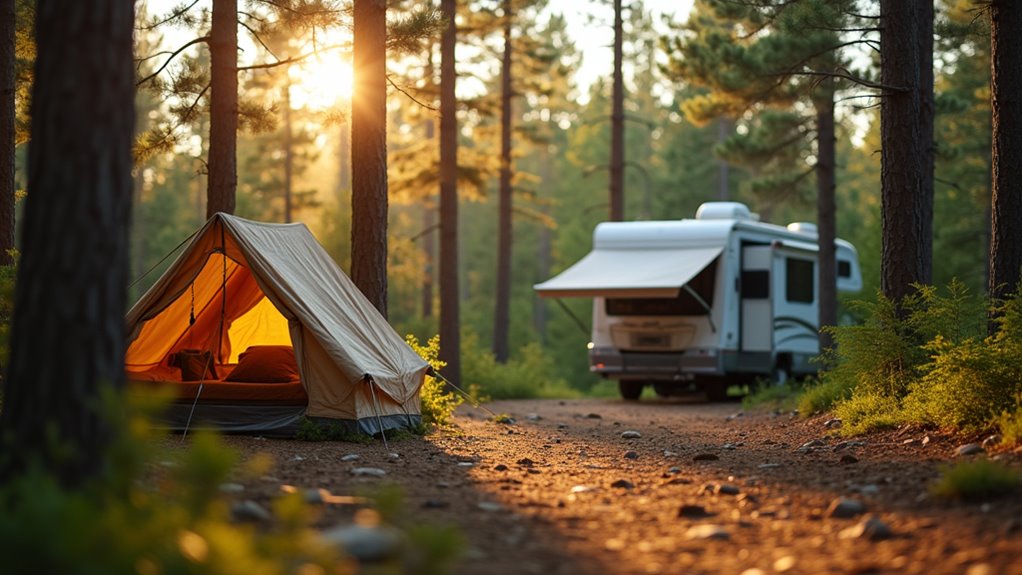
While comfort and cost matter markedly, the environmental footprint of your camping choice deserves serious consideration. RVs consume considerably more fuel, especially when towing or driving larger models to remote locations. You’ll burn through gas money while contributing to higher carbon emissions.
However, if you’re camping frequently, that initial environmental cost gets spread across multiple trips.
Tent camping wins the sustainability battle hands-down. You’re using minimal resources, leaving smaller footprints, and typically choosing human-powered transportation for shorter distances. Your gear lasts years with proper care, and you’re not burning fossil fuels just to sleep comfortably.
Both camping styles should embrace Leave No Trace principles to minimize environmental impact regardless of your accommodation choice.
Consider your camping frequency and distance traveled. Weekend warriors might find tent camping more environmentally responsible, while full-time RVers can justify their larger footprint through extended use.
Getting comfortable with RV systems requires mastering electrical hookups, water connections, and waste management—skills that take time but transfer to future trips. You’ll spend your first few outings learning leveling procedures, generator operation, and troubleshooting basic issues. While the initial learning curve feels steep, these technical skills become second nature.
Tent camping develops different expertise. You’ll master campfire building, weather reading, and minimal-gear cooking. These wilderness skills connect you directly with nature and build genuine self-reliance. Setting up camp becomes faster with practice, and you’ll learn efficient packing techniques.
Both styles teach valuable lessons. RV camping builds mechanical knowledge and systems thinking. Tent camping develops outdoor instincts and resourcefulness. Just like learning snowboarding, following essential tips from experienced campers helps beginners avoid common mishaps and accelerates skill development. Your choice depends on whether you prefer learning technical systems or traditional camping crafts.
Picture yourself weighing your options: you’re either backing up to a campsite with your home-on-wheels, complete with flushing toilets and air conditioning, or you’re unrolling your sleeping bag under a canopy of stars. Your wallet’s thickness, comfort preferences, and adventure appetite will guide this choice. Whether you’re seeking plug-and-play convenience or earning your outdoor stripes the hard way, both paths lead to memorable experiences—just with different price tags attached.